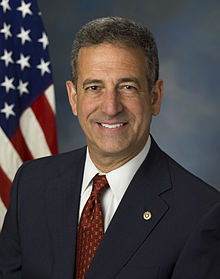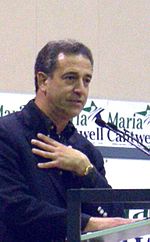
Russ Feingold
Russ Feingold | |
|---|---|
 Feingold in 2015 | |
| United States Special Envoy for the African Great Lakes and the Congo-Kinshasa | |
| In office July 18, 2013 – March 6, 2015 | |
| President | Barack Obama |
| Preceded by | Barrie Walkley |
| Succeeded by | Tom Perriello |
| United States Senator from Wisconsin | |
| In office January 3, 1993 – January 3, 2011 | |
| Preceded by | Bob Kasten |
| Succeeded by | Ron Johnson |
| Member of the Wisconsin Senate from the 27th district | |
| In office January 3, 1983 – January 3, 1993 | |
| Preceded by | Everett Bidwell |
| Succeeded by | Joseph Wineke |
| Personal details | |
| Born | Russell Dana Feingold March 2, 1953 Janesville, Wisconsin, U.S. |
| Political party | Democratic |
| Spouses | Sue Levine
(m. 1977; div. 1986)Mary Speerschneider
(m. 1991; div. 2005)Christine Ferdinand (m. 2013) |
| Children | 2 |
| Education | University of Wisconsin–Madison (BA) Magdalen College, Oxford (BA) Harvard University (JD) |
| Signature | |
Russell Dana Feingold (/ˈfaɪnɡoʊld/ FYNE-gold; born March 2, 1953) is an American politician and lawyer who served as a United States Senator from Wisconsin from 1993 to 2011. A member of the Democratic Party, he was its nominee in the 2016 election for the same U.S. Senate seat he had previously occupied.[1] From 1983 to 1993, he was a Wisconsin State Senator representing the 27th District.[2]

With John McCain, Feingold received the 1999 John F. Kennedy Profile in Courage Award.[3] He and McCain cosponsored the Bipartisan Campaign Reform Act of 2002 (McCain–Feingold Act), a major piece of campaign finance reform legislation. He was the only senator to vote against the Patriot Act of 2001.

Feingold was mentioned as a possible candidate in the 2008 presidential election, but in November 2006 announced he would not run.[4] In 2010, Feingold lost his campaign for reelection to the U.S. Senate to Republican nominee Ron Johnson.[5][6] On June 18, 2013, he was selected by Secretary of State John Kerry to replace R. Barrie Walkley as a special envoy to the Great Lakes region of Africa.[7]

On May 14, 2015, Feingold announced his candidacy for his old Senate seat in 2016.[1] He was defeated by Johnson in a rematch of their 2010 Senate race.[8] In 2020, Feingold became president of the American Constitution Society.

Early life, education, and career
Feingold was born in Janesville, Wisconsin, to a Jewish family. His grandparents were immigrants from Russia and Galicia.[9] His father, Leon Feingold (1912–1980), was an attorney; his mother, Sylvia Feingold (née Binstock; 1918–2005), worked at a title company. Feingold was one of four children. Feingold's father and his older brother David, a Vietnam War conscientious objector, were the major influences on his political development as a youth.[10] As a boy he was also involved with the B'nai B'rith Youth Organization and Aleph Zadik Aleph.

In 1972, Feingold volunteered for the presidential campaign of New York City mayor John Lindsay. He later supported the presidential campaigns of Mo Udall and Ted Kennedy.[11]

After graduating from Joseph A. Craig High School, Feingold attended the University of Wisconsin–Madison and graduated in 1975 with a Bachelor of Arts degree with honors in political science. He was a member of the Phi Beta Kappa honor society and was inducted into the Iron Shield Society, which is considered the highest honor achievable by University of Wisconsin-Madison undergraduate students.[12] Feingold then went to Magdalen College at the University of Oxford on a Rhodes Scholarship, where he graduated in 1977 with a first-class honours Bachelor of Arts in jurisprudence. Upon returning to the U.S., he attended Harvard Law School, receiving his J.D. with honors in 1979.[2][13]

Feingold worked as an attorney at the private law firms of Foley & Lardner and La Follette & Sinykin from 1979 until 1985.[14]

Wisconsin Senate
In 1982, Feingold was elected to the Wisconsin Senate, where he served for ten years until his election to the United States Senate. After he was elected to the United States Senate, Feingold was succeeded in the state senate by Joe Wineke.[15]

U.S. Senate

Elections
1992
Feingold's senatorial career began in 1992 with a victory over incumbent Republican Senator Bob Kasten. Feingold had little name recognition in the state and was campaigning in a primary against Congressman Jim Moody and businessman Joe Checota, but adopted several proposals to gain the electorate's attention. He painted five promises on his garage door, calling it a contract with Wisconsin voters.[16] Among Feingold's promises was a pledge to rely on Wisconsin citizens for most of his contributions[17] and a pledge to hold a "listening session" in each of Wisconsin's 72 counties each year he was in office.[18][19]

Feingold released an advertisement featuring an Elvis Presley impersonator endorsing his candidacy.[20] His Republican opponent, Bob Kasten, responded to the ad with one of his own featuring another Elvis impersonator attacking Feingold's record.[21]

During the primary campaign, Feingold unveiled an 82-point plan that aimed to eliminate the deficit by the end of his first term.[22] The plan called for a raise in taxes and cuts in the defense budget, among other things, and was derided as "extremist" by Republicans and "too liberal" by his Democratic opponents. Feingold also announced his support for strict campaign finance reform and a national health care system and voiced his opposition to term limits and new tax cuts.[23]

Feingold won by positioning himself as a quirky underdog who offered voters an alternative to what was seen by many as negative campaigning of opponents Jim Moody and Joe Checota.[24] On primary day, Feingold, who had polled in the single digits during much of the campaign, won 70% of the vote.[23] Seven weeks later, while Bill Clinton, George H. W. Bush, and Ross Perot split the Wisconsin presidential vote 41%-37%-21%, Feingold beat Kasten, 53% to 46%.[24]

1998
During his 1998 reelection campaign, Feingold was outspent by his Republican opponent, Representative Mark Neumann, and targeted by the National Republican Senatorial Committee.[25] Feingold placed a cap on his own fundraising, pledging not to raise or spend more than $3.8 million (one dollar for every citizen of Wisconsin) during the campaign, and turning away Democratic Party soft money.[26] He requested that several lobby groups, including the AFL–CIO and the League of Conservation Voters, refrain from airing pro-Feingold "issue ads".[27] Some Democrats were angry at Feingold for "putting his career at risk" with these self-imposed limits.[27] Neumann also limited himself to $3.8 million in spending, but allowed soft money to be used in his favor by outside groups.[26] A strong showing in the Democratic strongholds of Milwaukee and Madison allowed Feingold to win the election by about two percentage points.[28]

2004
In the 2004 Senate election, Feingold defeated the Republican candidate, businessman Tim Michels, by 11 percentage points (55%-44%), earning a third term.[29] During the campaign, Feingold refrained from imposing spending caps on himself as he had in the past, and raised and spent almost $11 million. In 2004, Feingold spent nearly $3.7 million, or about 67%, more than his opponent. PolitiFact.com rated Feingold's frequent assertion that he had been outspent by opponents in every U.S. Senate election "pants on fire."[30]

In late December 2004, Feingold was appointed to be one of four deputy whips for the Senate Democrats.[31]

2010
Feingold was defeated for reelection on November 2, 2010, by Oshkosh businessman Ron Johnson, 52% to 47%.[32]

2016
On May 14, 2015, Feingold announced his candidacy for U.S. Senate against the incumbent, Republican Ron Johnson.[1]

In his 2016 campaign, Feingold said he would no longer adhere to his longstanding pledge to raise the majority of his campaign funds from Wisconsin residents. Feingold said the pledge had been made on an election-to-election basis and no longer made sense.[19][33] As of March 2016, Feingold had raised the most money among all U.S. Senate candidates challenging an incumbent. Nearly three-fourths of his individual contributions were from outside Wisconsin.[34]

Groups financially supporting Feingold's election bid included Planned Parenthood, the League of Conservation Voters, American Bridge 21st Century, and the National Abortion Rights Action League.[35] In May 2016, Senator Bernie Sanders endorsed Feingold and engaged in fundraising for him.[36]

In the November 8, 2016, general election, Feingold was defeated by Johnson. Feingold received slightly less than 47%, and Johnson received slightly more than 50%, of the vote.[37]

Committee assignments
- Committee on the Budget
- Committee on the Judiciary
- Committee on Foreign Relations
- Select Committee on Intelligence[38]
Tenure

During his time in the U.S. Senate, Feingold gained a reputation as a political maverick with an independent streak. When he broke with his own party, it was often because he was taking a more liberal or populist position than other Democrats.[39][40] Throughout his congressional tenure, several ranking systems placed Feingold among the nation's most liberal or progressive senators.[41][42]

During the impeachment trial of Bill Clinton, Feingold was the only Democratic senator to vote against a motion to dismiss Congress's impeachment case against President Bill Clinton. Feingold ultimately voted against conviction on all charges.[40]

Feingold opposed NAFTA and numerous other free trade agreements.[40]


In 2001, Feingold was the only senator to vote against the Patriot Act (H.R. 3162).[43] Also in 2001, Feingold voted for the confirmation of Attorney General John Ashcroft.[44]

On December 21, 2004, Feingold wrote an article for the website Salon about a golfing trip to Greenville, Alabama.[45] After noting how friendly the people were, and that Wisconsin had many similar places, he expressed his sorrow that such a poverty-stricken area was "the reddest spot on the whole map" despite Republican policies that Feingold considered destructive to the well-being of the poor and middle class. Alabama Governor Bob Riley and Greenville Mayor Dexter McLendon, both Republicans, were perturbed at Feingold's description of "check-cashing stores and abject trailer parks, and some of the hardest-used cars for sale on a very rundown lot." McLendon invited Feingold back for a more complete tour of the city, and Feingold agreed. He visited the city on March 28, 2005, making amends and increasing speculation about his presidential plans for 2008.[46]

In May 2006, Feingold voted in favor of bill S.2611, the Comprehensive Immigration Reform Act of 2006, an immigration reform bill that was designed to give most illegal immigrants a chance to become legal citizens.[47]

Feingold co-sponsored a number of failed bills calling for the abolition of the death penalty.[48][49]

In 2009, Feingold voted against confirmation of Timothy Geithner to be United States Secretary of the Treasury, citing Geithner's personal tax issues.[50] Also in 2009, Feingold announced that he was planning to introduce a constitutional amendment that would prohibit governors from making temporary Senate appointments instead of holding special elections.[51]

Feingold cosponsored the Veterans Health Care Budget Reform and Transparency Act, which was signed into law in October 2009.[52]

Campaign finance reform
Feingold is perhaps best known for his work with Senator John McCain on the Bipartisan Campaign Reform Act of 2002, better known as the McCain–Feingold Act.[53] The legislation, which took seven years to pass, became defunct in the wake of several U.S. Supreme Court decisions.[54][55]

Wall Street reform
On May 20, 2010, Feingold was one of two Democratic senators to vote against the Dodd–Frank Wall Street reform bill,[56] citing his belief that the measures did not go far enough.[57] On July 15, 2010, he became the only Democratic senator to vote against the bill when it was brought up again; it passed by a 60–39 vote.[58]

Patriot Act

Feingold was the only senator to vote against the Patriot Act when it was first introduced in 2001,[59][60] saying that its provisions infringed upon citizens' civil liberties.[61]

When the bill was up for renewal in late December 2005, Feingold led a bipartisan coalition of senators – including Lisa Murkowski, Ken Salazar, Larry Craig, Dick Durbin and John Sununu – to remove some of the act's more controversial provisions.[62] Feingold led a filibuster against renewal of the act. In February 2006, the Senate voted 96–3 to break the filibuster and to extend the Patriot Act.[63][64]

In 2009, when the act was again up for reauthorization, Feingold introduced the JUSTICE Act (S. 1686) "To place reasonable safeguards on the use of surveillance and other authorities under the USA PATRIOT Act."[65] Senator Patrick Leahy then introduced an alternative bill, about which Feingold later said "...while narrower than the JUSTICE Act that Senator Durbin and I have championed, [it] did contain several important and necessary protections for the privacy of innocent Americans." After what Feingold saw as the further watering down of civil liberty protections in the bill, it passed out of the Senate Judiciary Committee on October 8 by a vote of 11 to 8[66] with Feingold voting against it.[67]

War in Iraq
Feingold was one of 23 senators to vote against H.J. Resolution 114, which authorized President George W. Bush to use force against Iraq in 2002.[68]

On August 17, 2005, he became the first senator to call for the withdrawal of troops from Iraq and urge that a timetable for that withdrawal be set. He called other Democrats "timid" for refusing to take action sooner, and suggested December 31, 2006, as the date for total withdrawal of troops. On the subject of Bush's assertion that a deadline would be helpful to Iraqi insurgents, Feingold said, "I think he's wrong. I think not talking about endgames is playing into our enemies' hand."[69]

On April 27, 2006, Feingold announced that he would move to amend an appropriations bill granting $106.5 billion in emergency spending measure for Iraq and Hurricane Katrina relief to require that troops withdraw completely from Iraq.[70]

Call for a vote of censure against President Bush
On March 14, 2006, Feingold introduced a resolution in the Senate to censure President Bush.[71] This was a result of allegations of illegal wiretapping under the Foreign Intelligence Surveillance Act of 1978 (FISA), which mandates use of a surveillance court for approval of wiretaps on Americans. Feingold made a 25-minute speech on the Senate floor, declaring that Congress must "hold the president accountable for his actions". It received support from Senators Tom Harkin of Iowa and Barbara Boxer of California, but most Democratic senators avoided expressing an opinion on it. Senators John Kerry of Massachusetts and Patrick Leahy of Vermont expressed support for the bill, but Feingold was able to find only three co-sponsors.

Feingold again called for Bush's censure in July 2007 for his management of the Iraq war, accusing him of mounting an "assault" against the United States Constitution.[72]

Health care policy

Feingold supports the creation of a system of universal health care in America. During his first run for the Senate, he endorsed the single-payer model, in which the government pays for all healthcare costs.[73]

On July 24, 2006, at a press conference at the Martin Luther King Heritage Health Center in Milwaukee, Wisconsin, Feingold announced that he had authored the State-Based Health Care Reform Act, a bill to create a pilot program for a system of universal healthcare under which each U.S. state would create a program to provide its citizenry with universal health insurance and the federal government would provide the funding. The bill would create a nonpartisan "Health Care Reform Task Force," which would provide five-year federal grants to two or three states. The program was expected to cost $32 billion over 10 years.[74]

Feingold voted for the Patient Protection and Affordable Care Act that passed the Senate on December 24, 2009.[75]

Gun policy
Feingold has voted in favor of certain gun-control legislation while also voting to expand certain gun rights.[76] He signed the congressional amicus brief in District of Columbia v. Heller, the U.S. Supreme Court case that overturned a handgun ban in Washington, D.C.[77]

Feingold has voted in favor of bills to require background checks for handgun buyers, to require background checks for firearms purchases at gun shows, and to require that handguns be sold with trigger locks.[76] He supported President Barack Obama's 2016 executive orders to expand background checks and strengthen enforcement of existing gun laws.[78]

Social issues
Feingold supports abortion rights.[35]

In 1996, Feingold was in a minority of legislators who voted against the Defense of Marriage Act, which President Bill Clinton signed into law.[49] In an April 4, 2006 interview, Feingold announced that he favored the legalization of same-sex marriage.[79]

On May 18, 2006, Feingold walked out of a meeting of the Senate Judiciary Committee shortly before a vote on a constitutional amendment to ban same-sex marriage. Feingold objected to both the amendment and decision of Chairman Arlen Specter (R-PA at the time) to move the meeting to an area of the Capitol Building not open to the public. Later that day, the committee voted to send the amendment to the full Senate.[80]

2008 possible presidential bid

In late January 2005, Feingold told the Tiger Bay Club of Volusia County, Florida that he intended to travel around the country before deciding whether or not to run in 2008.[81] In March 2005, his Senate campaign staff registered the domain www.russfeingold08.com, as well as the .org and .net versions.[82] On June 1, 2005, Feingold launched a political action committee (PAC), the Progressive Patriots Fund. A "draft Feingold" movement was established independently of his campaign.[83]

On August 17, 2005, Feingold became the first U.S. Senator of either party to suggest a firm date for American withdrawal from the Iraq War, saying that he favored a complete withdrawal by no later than December 31, 2006.[69]

Feingold supported John Roberts's Supreme Court nomination in September 2005, and was one of three Democrats on the Senate Judiciary Committee to vote in favor of sending the nomination to the floor for a final vote. Feingold graduated from Harvard Law School the same year as Roberts, 1979.[84] Four months later, in January 2006, he voted against Samuel Alito's nomination to the Court in committee and against cloture of debate on the nomination.[85]

Considered a long shot for president, Feingold announced in November 2006 that he would not seek his party's nomination in 2008.[86] He said that a presidential campaign would detract from his focus on the Senate, and the resulting scrutiny "would dismantle both my professional life (in the Senate) and my personal life."[4] In his parting comments he warned his supporters against supporting anyone for the presidency who voted for the Iraq War, whether they later regretted it or not, saying his first choice for president in 2008 was someone who voted against the war, and his second choice is someone who was not in Congress but spoke out against the war at the time.[4]

On February 22, 2008, he said he had voted for Obama in Wisconsin's Democratic presidential primary election.[87]

Post-congressional career
Following his 2010 defeat, Feingold was appointed a visiting professor at Marquette University Law School.[citation needed] He wrote a book titled While America Sleeps: A Wake-Up Call to the Post-9/11 World, and supported Obama's reelection in 2012.[88] In February 2012, it was announced that Feingold would be a co-chair of Obama's reelection campaign.[89] In 2012, he was the Mimi and Peter E. Haas Distinguished Visitor at Stanford Law School.[90] In 2012–13, he was the Stephen Edward Scarff Distinguished Visiting professor at Lawrence University.[91]

In February 2011, Feingold formed Progressives United, a Political Action Committee, and an affiliated nonprofit entity called Progressives United Inc.[2] Progressives United's stated aim was "directly and indirectly supporting candidates who stand up for our progressive ideals."[92] From 2011 to 2015, the two groups raised and spent $10 million. The PAC has helped raise money for more than 50 progressive candidates, including the largest beneficiary, then-candidate Elizabeth Warren, who successfully defeated incumbent Scott Brown in 2012.[93] Progressives United Inc. shut down in late 2014, and the Progressives United PAC suspended its fundraising activities in May 2015 in order to avoid the appearance of a conflict of interest with Feingold's 2016 Senate campaign.[94][95][96]

Feingold had received encouragement from Democrats to run for office in an expected recall election against Wisconsin Governor Scott Walker, but in August 2011 he announced that he had no plans to run for office in 2012 in either a gubernatorial recall election or the election to Wisconsin's other U.S. senate seat.[97]


On June 18, 2013, Feingold was appointed United States Special Representative for the African Great Lakes region and the Democratic Republic of the Congo by United States Secretary of State John Kerry.[98] He announced his departure from the position on February 24, 2015.[99]

In 2016, Feingold ran for his former senate seat and lost the election to Johnson again.[37]

In November 2019, Feingold became a member of the ReFormers Caucus of Issue One.[100]

In February 2020, Feingold was named president of the American Constitution Society.[101]

Personal life
Feingold resides in Middleton, Wisconsin. He is a member of Beth Hillel Temple in Kenosha, Wisconsin, where his sister, Dena Feingold, is rabbi.[102]

Feingold was married to Sue Levine from 1977 until 1986. They had two children. He married Mary Speerschneider in 1991; in 2005, the couple announced they would divorce.[103] In 2013, Feingold married Dr. Christine Ferdinand, a fellow at Magdalen College at Oxford University in England.[104]

In 2011, Feingold received a Freedom Medal from the Roosevelt Institute.[105]

Electoral history
| Candidate | Pct | Candidate | Pct | Candidate | Pct | ||
|---|---|---|---|---|---|---|---|
| Russ Feingold | 69% | Jim Moody | 14% | Joe Checota | 14% |
| Year | Democrat | Votes | Pct | Republican | Votes | Pct | 3rd Party | Party | Votes | Pct | 3rd Party | Party | Votes | Pct | 3rd Party | Party | Votes | Pct | ||||||
|---|---|---|---|---|---|---|---|---|---|---|---|---|---|---|---|---|---|---|---|---|---|---|---|---|
| 1992 | Russ Feingold | 1,290,662 | 53% | Bob Kasten (inc.) | 1,129,599 | 46% | Patrick W. Johnson | Independent | 16,513 | 1% | William Bittner | Libertarian | 9,147 | <1% | Mervin A. Hanson, Sr. | Independent | 3,264 | <1% | * | |||||
| 1998 | Russ Feingold (inc.) | 890,059 | 51% | Mark Neumann | 852,272 | 48% | Robert R. Raymond | U.S. Taxpayers | 7,942 | <1% | Tom Ender | Libertarian | 5,591 | <1% | Eugene A. Hem | Independent | 4,266 | <1% | * | |||||
| 2004 | Russ Feingold (inc.) | 1,632,697 | 55% | Tim Michels | 1,301,183 | 44% | Arif Khan | Libertarian | 8,367 | <1% | Eugene A. Hem | Independent | 6,662 | <1% | * | |||||||||
| 2010 | Russ Feingold (inc.) | 1,020,958 | 47% | Ron Johnson | 1,125,999 | 52% | Rob Taylor | Constitution | 23,349 | 1% | ||||||||||||||
| 2016 | Russ Feingold | 1,380,335 | 47% | Ron Johnson (inc.) | 1,479,471 | 50% | Phil Anderson | Libertarian | 87,531 | 3% |
*Write-in and minor candidate notes: In 1992, Robert L. Kundert received 2,747 votes, Joseph Selliken received 2,733 votes, and other write-ins received 459 votes. In 1998, write-ins received 706 votes. In 2004, write-ins received 834 votes.

Further reading
- Horwitt, Sanford D. (2007). Feingold: A New Democratic Party. Simon & Schuster. ISBN 978-1-4165-3492-1.
See also
References
- ^ a b c Robillard, Kevin (May 14, 2015). "Feingold running for Wisconsin Senate". Politico. Retrieved 10 February 2016.
- ^ a b c Nelson, James (February 4, 2016). "Sen. Ron Johnson claims Russ Feingold is a career politician". Milwaukee Journal Sentinel. PolitiFact. Retrieved 10 February 2016.
- ^ "Feingold wins JFK Profile in Courage award". Milwaukee Business Journal. May 24, 1999. Retrieved 10 February 2016.
- ^ a b c "Feingold rules out 2008 run for president". Milwaukee Journal Sentinel. November 11, 2006. Archived from the original on March 20, 2007. Retrieved March 3, 2015.
- ^ Pelofsky, Jeremy (November 3, 2010). "Wisconsin's Feingold loses Senate re-election bid, NBC projects". Reuters. Retrieved November 3, 2010.
- ^ Katz, Neil (November 3, 2010). "Feingold Falls in Wisconsin, CBS News Projects". CBS News. Archived from the original on November 4, 2010. Retrieved November 3, 2010.
- ^ Lee Myers, Steven (June 18, 2013). "Ex-Senator Feingold Chosen as Special Envoy to African Region". The New York Times. Retrieved June 19, 2013.
- ^ Sommerhauser, Mark; Verburg, Steven (November 9, 2016). "Ron Johnson defeats Russ Feingold in Wisconsin's U.S. Senate race". Wisconsin State Journal. Retrieved November 9, 2016.
- ^ U.S. Census, January 1, 1920, Wisconsin, Rock County, Janesville, enumeration district 112, p. 22-B, family 556. U.S. Census, January 1, 1920, Tennessee, Shelby County, Memphis, enumeration district 109, p. 2-A, family 29. Rachel Binstock entry; SS Nieuw Amsterdam Passenger Manifest, 17 February 1913, p. 932, line 8.
- ^ Martelle, Scott (July 23, 2007). "Feingold biography just skims the surface". Los Angeles Times. Retrieved 10 February 2016.
- ^ Opin, Ken (August 27, 1996). "Dole Rip, Gore Fire Up Crowd". Wisconsin State Journal. Archived from the original on February 6, 2009.
- ^ "Iron Shield Society » Wisconsin Union". union.wisc.edu. Retrieved 2022-09-05.
- ^ How Rhodes Scholars Think; Ben Eastaugh and Chris Sternal-Johnson; 2009
- ^ Kertscher, Tom (September 14, 2010). "Ron Johnson ad says Sen. Russ Feingold has never held a job outside of politics". Milwaukee Journal Sentinel. PolitiFact. Retrieved 10 February 2016.
- ^ "The State: The state of Wisconsin 1985-1986 blue book: Biographies and pictures". wisc.edu.
- ^ Stiles, Andrew (October 28, 2010). "Feingold Breaks Garage Door Promise". National Review. Retrieved 10 February 2016.
- ^ Drusch, Andrea (August 13, 2015). "Feingold's Early Fundraising Breaks Longtime Campaign-Finance Pledge". The Atlantic. Retrieved 10 February 2016.
- ^ Ross, JR (May 14, 2015). "Russ Feingold and His Ghosts". Politico. Retrieved 10 February 2016.
- ^ a b Nelson, James B. (October 28, 2015). "Russ Feingold changes his tune on campaign contributions". PolitiFact. Retrieved 10 February 2016.
- ^ "Wisconsin Senate: The Candidates". Washington Post. September 9, 1998. Retrieved June 5, 2007.
- ^ Marcus, Greil (January 17, 1993). "The Elvis Test". San Francisco Examiner. Archived from the original on April 5, 2007. Retrieved June 6, 2007.
{{cite news}}: CS1 maint: unfit URL (link) - ^ Odegard, Sue (1999). "Feingold tackles health care, capital punishment, COPS grants at River Falls Listening Session". River Falls Journal. Archived from the original on November 27, 2003. Retrieved June 6, 2007.
- ^ a b Sykes, Charles J. (November 2, 1992). "The next Bill Proxmire? — US Senate race between Democrat Russ Feingold and Republican Robert W. Kasten in Wisconsin". National Review. Archived from the original on February 12, 2006. Retrieved June 6, 2007.
- ^ a b Wagner, Jeff (September 17, 2004). "A Republican Senator from Wisconsin in 2004?". WTMJ-AM. Archived from the original on January 3, 2006. Retrieved June 6, 2007.
- ^ Nichols, John (September 22, 2002). "Rockin' in the Real World". The Nation. Archived from the original on September 15, 2012. Retrieved June 6, 2007.
{{cite web}}: CS1 maint: unfit URL (link) - ^ a b Ratnesar, Romesh (October 26, 1998). "The system bites back". Time. CNN. Retrieved 10 February 2016.
- ^ a b "Online NewsHour". PBS. Archived from the original on 5 March 2000. Retrieved 10 February 2016.
- ^ Morton, Bruce; Rothenberg, Stuart. "Feingold survives bid by Republican Neumann". CNN. Retrieved 10 February 2016.
- ^ "2004 Statewide Election Results" (PDF). Government Accountability Board. Archived from the original (PDF) on 13 August 2015. Retrieved 10 February 2016.
- ^ Kertscher, Tom (September 20, 2010). "Russ Feingold says he's been outspent by opponents in every U.S. Senate election". Milwaukee Journal Sentinel. PolitiFact. Retrieved 10 February 2016.
- ^ Moyers, Bill (December 5, 2008). "Senator Russ Feingold". PBS. Retrieved 10 February 2016.
- ^ Johnson, Dirk (November 2, 2010). "What Feingold's Loss Means for Progressives". Newsweek.
- ^ Gilbert, Craig (August 13, 2015). "Johnson hits Feingold for dropping past fundraising pledge". Milwaukee Journal Sentinel. Retrieved 10 February 2016.
- ^ Sommerhauser, Mark (March 13, 2016). "Russ Feingold's national profile powers fundraising, but out-of-state money rankles critics". Wisconsin State Journal. Retrieved 28 March 2016.
- ^ a b Bice, Daniel (August 23, 2015). "Big money pouring into Senate race". Milwaukee Journal Sentinel. Retrieved 10 February 2016.
- ^ "Sanders fundraising for Russ Feingold". Politico. 26 May 2016.
- ^ a b "Wisconsin U.S. Senate Results: Ron Johnson Wins". The New York Times. November 16, 2016. Retrieved 17 November 2016.
- ^ "Biography of U.S. Senator Russ Feingold". U.S. Senator Russ Feingold. Archived from the original on March 26, 2008. Retrieved 10 February 2016.
{{cite web}}: CS1 maint: unfit URL (link) - ^ Nichols, John (September 23, 2010). "Russ Feingold, the Senate's True Maverick". The Nation. Retrieved 10 February 2016.
- ^ a b c Gilbert, Craig (September 19, 2010). "Feingold's votes support maverick label". Milwaukee Journal Sentinel. Retrieved 10 February 2016.
- ^ Silver, Nate (June 10, 2008). "Liberal-Conservative Rankings Done Right". FiveThirtyEight. Retrieved 10 February 2016.
- ^ Corasaniti, Nick (May 14, 2015). "Russ Feingold Will Run for Senate in Wisconsin". New York Times. Retrieved 10 February 2016.
- ^ Friedersdorf, Conor (June 14, 2013). "Russ Feingold Tried to Warn Us About Section 215 of the Patriot Act". The Atlantic. Retrieved 10 February 2016.
- ^ "Feingold vote paves way for Ashcroft". Washington Times. January 31, 2001. Retrieved 10 February 2016.
- ^ Feingold, Russ (December 21, 2004). "Goin' South". Salon.com. Retrieved June 6, 2007.
- ^ Gilbert, Craig (March 29, 2005). "Feingold in Dixie on mission of diplomacy". Milwaukee Journal Sentinel. Archived from the original on August 20, 2006. Retrieved June 6, 2007.
- ^ Umhoefer, Dave (November 1, 2010). "Ron Johnson says U.S. Sen. Russ Feingold voted to give Social Security benefits to illegal immigrants". Milwaukee Journal Sentinel. PolitiFact. Retrieved 10 February 2016.
- ^ Isenstadt, Alex (March 20, 2009). "Feingold pushes end to death penalty". Politico. Retrieved 10 February 2016.
- ^ a b Friedersdorf, Conor (June 11, 2014). "Comparing Hillary Clinton to Russ Feingold, Whose Record Is Better?". The Atlantic. Retrieved 10 February 2016.
- ^ "Uphill in Wisconsin". New York Times. October 12, 2010. Retrieved 10 February 2016.
- ^ Thrush, Glenn (January 25, 2009). "Feingold wants Constitutional amendment to ban gov appointments". Politico. Retrieved 10 February 2016.
- ^ "Obama signs Feingold sponsored bill". WKOW. October 22, 2009. Archived from the original on 2018-08-11. Retrieved 10 February 2016.
- ^ Taylor, Jessica (May 14, 2015). "Taking Aim At Money In Politics, Feingold Announces Comeback Bid". National Public Radio. Retrieved 10 February 2016.
- ^ Schouten, Fredreka (May 14, 2015). "Avalanche of big money headed Feingold's way in Senate rematch". USA Today. Retrieved 10 February 2016.
- ^ Seelye, Katharine (November 4, 2010). "In Feingold's Loss, Independents Turn on One of Their Own". New York Times. Retrieved 10 February 2016.
- ^ "U.S. Senate: Roll Call Vote", United States Senate, May 20, 2010
- ^ Dennis, Brady (2010-07-16). "Congress passes financial reform bill". The Washington Post. Retrieved 2015-06-24.
- ^ "U.S. Senate: Roll Call Vote", United States Senate, July 15, 2010
- ^ Good, Chris (February 15, 2011). "Rand Paul vs. the PATRIOT Act". The Atlantic.
- ^ "U.S. Senate Roll Call Votes 107th Congress — 1st Session". U.S. Senate. Retrieved June 6, 2007.
- ^ Feingold, Russ (October 12, 2001). "Russell Feingold — On Opposing The U.S.A. Patriot Act". Archipelago. Retrieved June 6, 2007.
- ^ Nichols, John (December 16, 2015). "Feingold Beats Bush In Patriot Act Fight". The Nation. Retrieved 10 February 2016.
- ^ "Senate ends filibuster of Patriot Act". Washington Times. February 17, 2006. Retrieved 10 February 2016.
- ^ Kellman, Laurie (February 16, 2006). "Feingold filibusters Patriot Act extension". The Boston Globe. Retrieved 10 February 2016.
- ^ "S. 1686". govtrack.us. Retrieved October 8, 2009.
- ^ Bankston, Kevin (8 October 2009). "Obama Sides with Republicans; PATRIOT Act Renewal Bill Passes Senate Judiciary Committee Minus Critical Civil Liberties Reforms". Electronic Frontier Foundation. Retrieved October 8, 2009.
- ^ Feingold, Russ. "It's Not the Prosecutors' Committee, it's the Judiciary Committee". Daily Kos. Retrieved October 8, 2009.
- ^ "U.S. Senate Roll Call Votes 107th Congress — 2nd Session". U.S. Senate. Retrieved January 4, 2011.
- ^ a b Baker, Peter (August 18, 2005). "Feingold Urges Troop Withdrawal By End of '06". Washington Post. Retrieved June 6, 2007.
- ^ Hulse, Carl (April 27, 2007). "Tough road ahead on Iraq funding". San Jose Mercury News. Retrieved June 6, 2007.
- ^ "Relating to the censure of George W. Bush. (Introduced in Senate)". Library of Congress. March 13, 2006. Archived from the original on October 17, 2015. Retrieved June 6, 2007.
- ^ "Sen. Feingold Proposes Censuring Bush". Washington Post. July 22, 2007. Retrieved March 3, 2015.
- ^ "Sen. Russ Feingold (D-Wisconsin)". Washington Post. June 5, 2006. Retrieved 11 February 2016.
- ^ Schmid, John (July 24, 2006). "Feingold would give states sway over health care". Milwaukee Journal Sentinel. Archived from the original on August 23, 2006. Retrieved June 6, 2007.
- ^ Kertscher, Tom (May 27, 2015). "Russ Feingold cast deciding vote on Obamacare, Ron Johnson says". Milwaukee Journal Sentinel. PolitiFact. Retrieved 11 February 2016.
- ^ a b Gilbert, Craig (August 14, 2010). "Feingold blurs lines on gun rights". Milwaukee Journal Sentinel. Retrieved 10 February 2016.
- ^ Gilbert, Craig (March 18, 2008). "D.C. case will examine individual vs. collective right to bear arms". Milwaukee Journal Sentinel. Archived from the original on 16 February 2016. Retrieved 10 February 2016.
- ^ Cieslewicz, Dave (January 13, 2016). "Feingold steps up on guns". Isthmus. Retrieved 10 February 2016.
- ^ Balz, Dan (April 5, 2006). "Feingold Backs Legalizing Same-Sex Marriages". Washington Post. Retrieved 10 February 2016.
- ^ "Senate committee approves gay marriage ban". NBC News. May 18, 2006. Retrieved June 5, 2007.
- ^ Gilbert, Craig (February 4, 2005). "Feingold sizes up presidential race". Milwaukee Journal Sentinel. Archived from the original on October 31, 2006. Retrieved June 6, 2007.
- ^ Conklin, Melanie (March 16, 2005). "Feingold For Virtual President 2008". Wisconsin State Journal. Archived from the original on February 6, 2009. Retrieved June 6, 2007.
- ^ "Draft Russ Feingold for President". runrussrun.com. Archived from the original on April 3, 2007.
- ^ Nichols, John (September 22, 2005). "Most Disappointing Vote for John Roberts". The Nation. Retrieved 11 February 2016.
- ^ "Update: Kohl & Feingold Vote Against Alito". WSAW. January 24, 2006. Archived from the original on July 29, 2014. Retrieved 11 February 2016.
- ^ Sarasohn, Judy (November 12, 2006). "Feingold Won't Seek Democratic Nomination in 2008". Washington Post. Retrieved 11 February 2016.
- ^ Feingold: I voted for Obama. February 22, 2008. Archived February 25, 2008, at the Wayback Machine
- ^ Hamby, Peter (January 5, 2011). "Feingold plans book and teaching stint". CNN. Archived from the original on January 5, 2012. Retrieved January 6, 2011.
- ^ Byron Tau. "Obama campaign announces co-chairs". Politico.
- ^ Leighton, Joy (October 3, 2011). "Former Sen. Feingold to serve as distinguished visitor at Stanford's Haas Center". Stanford University. Retrieved 11 February 2016.
- ^ "Former U.S. Senator Russ Feingold Named Lawrence University Scarff Professor". Lawrence University News. July 10, 2012. Retrieved March 3, 2015.
- ^ Epstein, Jennifer (February 16, 2011). "Feingold launches progressive PAC". Politico. Retrieved 10 February 2016.
- ^ Lueders, Bill. "Bill Lueders: Feingold cause plays big in state". The Cap Times.
- ^ Bice, Daniel (June 15, 2015). "Russ Feingold's PAC funded fees, salaries for former staffers, himself". Milwaukee Journal Sentinel. Retrieved 10 February 2016.
- ^ Behr, Madeleine (October 19, 2015). "What did Feingold's PAC spend its money on?". USA Today. Retrieved 10 February 2016.
- ^ ""Progressives United," PAC founded by Democrat Russ Feingold suspends fundraising". Associated Press. May 21, 2015. Retrieved 10 February 2016.
- ^ James, Frank (August 19, 2011). "Russ Feingold Decides Not To Run For Wis. Governor, U.S. Senate". NPR. Retrieved 25 January 2024.
- ^ "Press Briefing Announcement Regarding Great Lakes Special Representative". U.S. Department of State. Retrieved 2019-01-06.
- ^ "Senator Feingold: Final Speech as U.S. Special Envoy to the DRC". United States Institute of Peace. February 24, 2015. Retrieved March 3, 2015.
- ^ "Issue One – ReFormers Caucus". 2023.
- ^ Thomsen, Jacqueline (March 22, 2020). "Russ Feingold Takes the Helm at the American Constitution Society". Law.com. The National Law Journal. Retrieved 8 April 2020.
- ^ Cohen, Leon (February 25, 2010). "Kenosha shul celebrates rabbi's 25 years there". Wisconsin Jewish Chronicle. Archived from the original on 22 March 2014. Retrieved 10 February 2016.
- ^ Skiba, Katherine M. (April 12, 2005). "Feingold, wife announce plans to end marriage". Milwaukee Journal Sentinel. Archived from the original on September 5, 2005. Retrieved June 5, 2007.
- ^ Holloway, Nigel (August 27, 2015). "Democrat Oxonian Russ Feingold on his fight to win back Wisconsin". Oxford Today. Archived from the original on August 11, 2018. Retrieved September 1, 2015.
- ^ "Franklin D. Roosevelt Four Freedoms Awards". Roosevelt Institute. Retrieved 10 February 2016.
- ^ "Election Statistics". Office of the Clerk of the House of Representatives. Archived from the original on July 30, 2008. Retrieved August 8, 2007.
External links
- 1953 births
- Alumni of Magdalen College, Oxford
- Obama administration personnel
- American people of Russian-Jewish descent
- American Rhodes Scholars
- Democratic Party United States senators from Wisconsin
- Harvard Law School alumni
- Jewish United States senators
- Living people
- Lawrence University faculty
- Marquette University faculty
- Politicians from Janesville, Wisconsin
- Stanford University fellows
- United States Department of State officials
- University of Wisconsin–Madison alumni
- Wisconsin lawyers
- Democratic Party Wisconsin state senators
- 21st-century American legislators
- People from Middleton, Wisconsin
- Jewish American state legislators in Wisconsin
- Liberalism in the United States
- United States Special Envoys
- Joseph A. Craig High School alumni
- Candidates in the 2016 United States Senate elections
See what we do next...
OR
By submitting your email or phone number, you're giving mschf permission to send you email and/or recurring marketing texts. Data rates may apply. Text stop to cancel, help for help.
Success: You're subscribed now !



